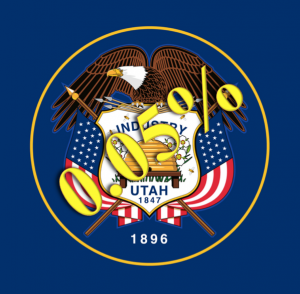 On March 8, 2017, Utah lawmakers passed legislation to lower the legal limit for a driver’s blood alcohol level to 0.05%.[1] On March 23, 2017, Utah’s governor Gary Herbert signed the bill into law, making Utah’s DUI threshold the lowest in the nation. The lowered blood alcohol limit will take effect in the state on December 30, 2018—just before New Year’s Eve.[2]
On March 8, 2017, Utah lawmakers passed legislation to lower the legal limit for a driver’s blood alcohol level to 0.05%.[1] On March 23, 2017, Utah’s governor Gary Herbert signed the bill into law, making Utah’s DUI threshold the lowest in the nation. The lowered blood alcohol limit will take effect in the state on December 30, 2018—just before New Year’s Eve.[2]
This is a distinct and separate law from Driving While Impaired or Driving Under the Influence. Accordingly, even if the driver is acting and driving normally, but has a blood alcohol level of .05% or more, the driver will “automatically” be considered to be impaired or under the influence. This type of situation is not uncommon. It frequently occurs when a person is stopped by the police for a taillight or registration violation and the officer detects the odor of an alcoholic beverage.
Those in favor of the lower limit call it the “international standard” because 100 countries around the world enforce 0.05% as the legal limit to drink and drive.[3] Across the United States, the current limit is 0.08%, although some states enforce a lower limit in certain circumstances, such as for commercial drivers (generally .04%) or for those under the age of 21 (generally .02%).
The amount of alcohol an individual could consume and maintain a blood alcohol level below 0.05% varies. Depending on factors such as gender, weight, and the amount of food consumed, a single drink could potentially make it illegal to drive according to the American Beverage Institute, which opposes the bill.[4] In contrast, supporters of the bill claim that a person would have to consume five cans of beer, or two-thirds of a bottle of wine, in an hour to reach the 0.05% blood alcohol level.[5]
Other states have considered lowering the limit, but Utah’s legislature is the first to pass such a bill. A similar proposal has been introduced and rejected in Hawaii, and Washington lawmakers are also considering lowering the legal limit for blood alcohol levels in drivers.[6] It is worth noting that the first state to make this move has a population that is nearly 60% Mormon—and Mormons are forbidden from drinking alcohol.[7]
The reasoning behind the push to reduce the legal limit appears to be a combination of deterrence and the goal of directly reducing injuries and deaths from drunk driving. Some who oppose the bill see it as targeted at the wrong culprits—the vast majority of drunk driving fatalities involve drivers with blood alcohol levels at 0.15% or higher.[8] Supporters, however, say they want to separate the concepts of drinking and driving completely, so that people who choose to drink opt out of driving.[9]
Notably, the Utah chapter of Mothers Against Drunk Driving does not support the lowered blood alcohol limit.[10] Instead, Art Brown, the president of the chapter, said the group prefers to focus on interlock devices prohibiting people from driving drunk. “MADD’s position is we really emphasize interlocks and getting those on people and staying .08,” Brown said.[11]
Now we have to wonder if these trends will change the law in Tennessee and other states. Only time will tell.
About the Author: Steven Oberman has been licensed in Tennessee since 1980, and successfully defended over 2,500 DUI defendants. Among the many honors bestowed upon him, Steve served as Dean of the National College for DUI Defense, Inc. (NCDD) and currently serves as chair of the National Association of Criminal Defense Lawyers DUI Committee. Steve was the first lawyer in Tennessee to be Board Certified as a DUI Defense Specialist by the NCDD.
He is the author of DUI: The Crime & Consequences in Tennessee, updated annually since 1991 (Thomson-West), and co-author with Lawrence Taylor of the national treatise, Drunk Driving Defense, 7th edition (Wolters Kluwer/Aspen). Steve has served as an adjunct professor at the University of Tennessee Law School since 1993 and has received a number of prestigious awards for his faculty contributions. He is a popular international speaker, having spoken at legal seminars in 30 states, the District of Columbia and three foreign countries.
The author would like to thank his associate attorney, Anna Rickels, for her research and contributions to this article.
If you would like to contact the author, please visit: http://www.tndui.com
[1] http://www.foxnews.com/politics/2017/03/09/utah-lawmakers-pass-bill-to-lower-dui-limit-to-0-05-percent.html
[2] http://www.foxnews.com/politics/2017/03/09/utah-lawmakers-pass-bill-to-lower-dui-limit-to-0-05-percent.html
[3] https://www.stgeorgeutah.com/news/archive/2017/02/24/mgk-utah-house-passes-bill-lowering-legal-blood-alcohol-limit-to-0-05/
[4] http://www.foxnews.com/politics/2017/03/09/utah-lawmakers-pass-bill-to-lower-dui-limit-to-0-05-percent.html
[5] https://www.stgeorgeutah.com/news/archive/2017/02/24/mgk-utah-house-passes-bill-lowering-legal-blood-alcohol-limit-to-0-05/
[6] http://www.deseretnews.com/article/865674571/Bill-lowering-legal-alcohol-limit-for-drivers-advanced-by-Senate-committee.html
[7] http://www.latimes.com/nation/la-na-utah-alcohol-limit-20161231-story.html
[8] http://www.foxnews.com/politics/2017/03/09/utah-lawmakers-pass-bill-to-lower-dui-limit-to-0-05-percent.html
[9] https://www.stgeorgeutah.com/news/archive/2017/02/24/mgk-utah-house-passes-bill-lowering-legal-blood-alcohol-limit-to-0-05/
[10] http://www.latimes.com/nation/la-na-utah-alcohol-limit-20161231-story.html
[11] http://www.latimes.com/nation/la-na-utah-alcohol-limit-20161231-story.html